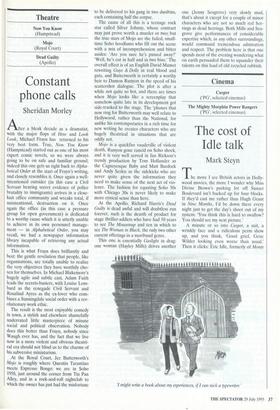Theatre
Now You Know (Hampstead) Mojo (Royal Court) Dead Guilty (Apollo)
Constant phone calls
Sheridan Morley
Ater a bleak decade as a dramatist, with the major flops of Here and Look Look, Michael Frayn has returned to his very best form. True, Now You Know (Hampstead) started out as one of his most expert comic novels, so we were always going to be on safe and familiar ground; indeed this one gets us right back to Alpha- betical Order at the start of Frayn's writing, and closely resembles it. Once again a well- intentioned outsider (in this case a Civil Servant bearing secret evidence of police brutality to immigrants) arrives in a close- knit office community and wreaks total, if unintentional, destruction on it. Once again the office (in this case a pressure group for open government) is dedicated to a worthy cause which it is utterly unable to achieve in its own personnel manage- ment — in Alphabetical Order, you may recall, we had a newspaper information library incapable of retrieving any actual information.
This is what Frayn does brilliantly and best: the gentle revelation that people, like organisations, are totally unable to realise the very objectives they have worthily cho- sen for themselves. In Michael Blakemore's hugely agile and subtle cast, Adam Faith leads the secrets-busters, with Louise Lom- bard as the renegade Civil Servant and Rosalind Ayres as the ex-lover who com- bines a Sunningdale social order with a rev- olutionary work ethic.
The result is the most enjoyable comedy in town, a stylish and elsewhere shamefully underrated little masterpiece of minute social and political observation. Nobody does this better than Frayn, nobody since Waugh ever has, and the fact that we live now in a more violent and obvious theatri- cal era should not blind us to the charms of his subversive miniaturism.
At the Royal Court, Jez Butterworth's Mojo is roughly where Quentin Tarantino meets Expresso Bongo: we are in Soho 1958, just around the corner from Tin Pan Alley, and in a rock-and-roll nightclub to which the owner has just had the misfortune
to be delivered to his gang in two dustbins, each containing half the corpse.
The cause of all this is a teenage rock star called Silver Johnny, whose contract may just prove worth a murder or two; but the true stars of Mojo are the failed, small- time Soho hoodlums who fill out the scene with a mix of incomprehension and bitter asides: 'Are you sure he's passed away?' `Well, he's cut in half and in two bins.' The overall effect is of an English David Mamet
rewriting Guys & Dolls in real blood and guts, and Butterworth is certainly a worthy
heir to Damon Runyon in the speed of his scattershot dialogue. The plot is after a while not quite so hot, and there are times
when Mojo looks like a screenplay that
somehow quite late in its development got side-tracked to the stage. The 'phones that now ring for Butterworth may well relate to Hollywood, rather than the National, for unlike his contemporaries in a rich time for new writing he creates characters who are hugely theatrical in situations that are oddly not.
Mojo is a quickfire vaudeville of violent death, Runyon gone rancid on Soho shock,
and it is very well served in Ian Rickson's trendy production by Tom Hollander as the Cagneyesque Baby and Matt Bardock and Andy Serkis as the sidekicks who are never quite given the information they need to make sense of the next act of vio- lence. The fashion for equating Soho 50s with Chicago 30s is never likely to make more cynical sense than here.
At the Apollo, Richard Harris's Dead Guilty is dead awful and will doubtless run forever, such is the dearth of product for stage thriller-addicts who have had 50 years to see The Mousetrap and ten in which to see The Woman in Black, the only two other current offerings in a moribund genre.
This one is essentially Gaslight in drag: one woman (Hayley Mills) drives another
one (Jenny Seagrove) very slowly mad, that's about it except for a couple of minor characters who are not so much red her- rings as dead herrings. Both Mills and Sea- grove give performances of considerable expertise which, in any other surroundings, would command tremendous admiration and respect. The problem here is that one spends most of the evening wondering what on earth persuaded them to squander their talents on this load of old recycled rubbish.


















































 Previous page
Previous page